Ukraine Says Over A Dozen Iranian Drones Downed Overnight
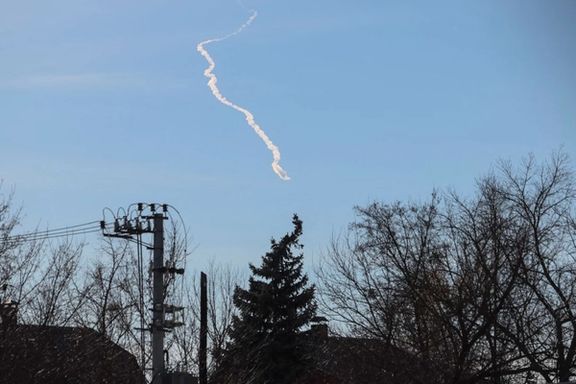
The Ukrainian Air Force said Monday it shot down 13 more Iranian drones that had taken off from southern Russia overnight to attack targets in Ukraine.

The Ukrainian Air Force said Monday it shot down 13 more Iranian drones that had taken off from southern Russia overnight to attack targets in Ukraine.
Air Force spokesperson Yurii Ihnat said on national television that the country’s air defenses shot down 13 out of 15 Iranian drones after air raid sirens sounded for hours in Kyiv.
The air force said Russian forces had launched Iran-made Shahed drones from the Bryansk region northeast Kyiv.
The AFP quoted the head of the Kiev’s military administration, Sergiy Popko as saying that drones had been heading for Kyiv but Ukraine’s air defense forces downed them and they did not cause injuries or hit infrastructure.
Tehran has been supplying Moscow with drones to use against Ukraine. The Islamic Republic has been hit by multiple rounds of sanctions from the US, the UK, and the European Union. Iranian officials claim the drones were sent to Russia prior to the war in Ukraine.
President Volodymyr Zelensky in December stated that Russia has received an additional 250 Shahed drones from Iran on top hundreds supplied earlier that have been used to attack Ukraine's energy sector and infrastructures.
Iranian foreign ministry spokesperson on Monday claimed that Kyiv has not been able to provide evidence of Iranian-made drones being used in Ukraine.
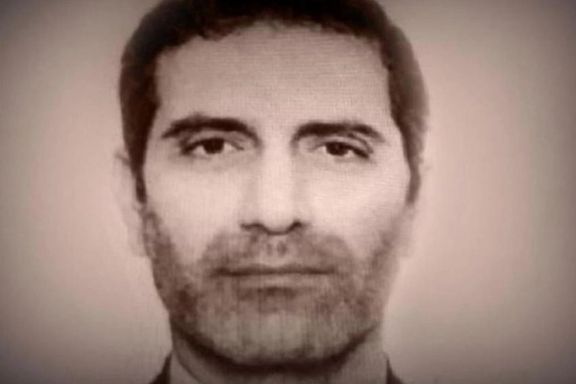
The Islamic Republic says it is ready for a prisoner swap with Belgium after the constitutional court in the European country upheld an exchange treaty.
The Constitutional Court of Belgium on Friday rejected a request to annul a prisoner exchange treaty with the Islamic Republic signed last year that can lead to the release of an Iranian diplomat, Assadollah Assadi, convicted of terrorism, for Belgian aid worker Olivier Vandecasteele, held hostage in Iran.
Iran’s foreign ministry spokesperson said Monday that the ground is ready to execute the prisoner exchange pact.
"With the recent development, we hope to see an opening in connection with the case of this diplomat," added Nasser Kanaani.
However, the Belgian Supreme Court said in its ruling that plaintiffs can appeal to lower courts to block Assadi’s repatriation to Iran.
Belgian aid worker Olivier Vandecasteele was arrested on a visit to Iran in February 2022 and sentenced in January to 40 years in prison and 74 lashes on charges including spying.
Brussels gave a 20-year jail term to Assadi in 2021 over a foiled bomb plot in the first trial of an Iranian official for suspected terrorism in Europe since Iran's 1979 revolution.
Under a treaty Belgium and Iran signed in 2022, Vandecasteele would have been eligible to be swapped for Assadi but in December Belgium’s constitutional court suspended the implementation of the treaty until it could make a ruling.
Some Belgian lawmakers voiced concern that the prisoner exchange treaty might lead to "hostage diplomacy" and put other Belgians at risk of detention.
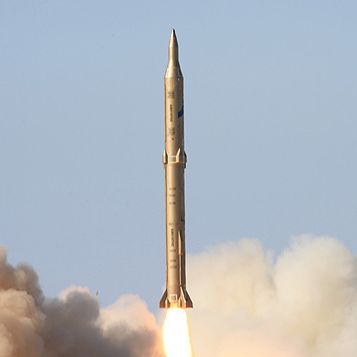
Western officials say Moscow has hesitated to buy ballistic missiles from Tehran out of concern that Ukraine’s allies would in response supply Kyiv with long-range rockets.
Iran has provided Russia with hundreds of kamikaze drones that have been used to attack Ukrainian infrastructure. Western countries say the Islamic Republic is open to further military cooperation with Russia.
However, Financial Times quoted some western officials that despite pressures on its own supplies, Russia has held back from purchases of Iran’s long-range ballistic missiles.
According to assessments in NATO countries, the Kremlin is afraid that Washington might provide Kyiv with the long-sought ATACMS missile system, whose 300km range could reach deep into Russian held territory in Crimea.
“The system has almost four times the range of US-supplied Himars missile systems that Ukraine has used to devastating effect against Russian forces,” adds the report.
Iran’s Fateh-313 and Zulfiqar ballistic missiles have ranges of 500km and 700km respectively.
Helped by Russia, Iran has developed the largest fleet of ballistic missiles in the Middle East under a program that Washington described in 2019 as “increasingly accurate” and “sophisticated”.
Western Officials say the Islamic Republic and Russia explored exchanging modern weaponry for ballistic missiles but those talks have stopped because of the potential repercussions of such a deal for both sides.
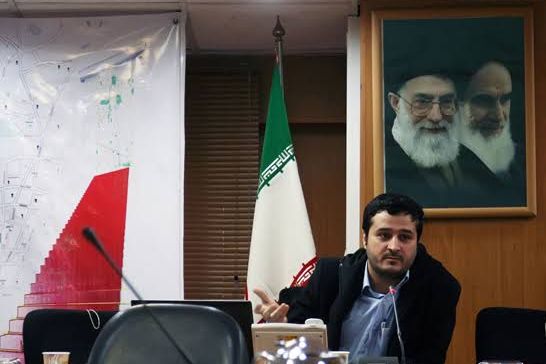
Iranian media say a journalist who had been following the news of gas attacks on girls’ schools in the religious city of Qom for the past few weeks, has been arrested.
Ali Pour-Tabatabaie, who is one of the administrators of Qom News website was reportedly detained on Sunday morning in Qom 120 kilometers south of Tehran.
According to local media, including Etemad Daily, there is still no information about which security or intelligence outfit arrested the journalist.
Milad Alavi, a reporter at Shargh, wrote in a tweet that Pour-Tabatabaie was arrested on Sunday morning but "called his sister at around 8 pm to let her know about his detention". However, due to the sudden disconnection of the phone he was unable to explain the reason for his arrest.
His arrest drew reactions of several journalists and activists in the country, including Abbas Abdi, a reformist commentator, who wrote on Twitter that the arrest of Pour-Tabatabaie "not only does not help to clear up the ambiguity about poisonings, but also makes it worse."
About 80 more schools were targeted by chemical attacks on Sunday with dozens of girls hospitalized.
The gas attacks, targeting girls' schools since November, intensified this week with hundreds more girls falling sick across Iran.
It is believed that the attacks are a coordinated effort to deter the young students from supporting ongoing unrest, triggered by the death of Mahsa Amini.
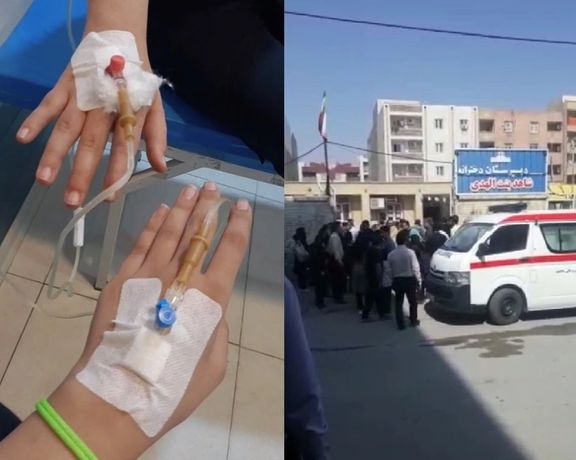
Iran's ruler Ali Khamenei said Monday that poisoning of schoolgirls in recent months is an "unforgivable" crime and denied any government role in the attacks.
"Authorities should seriously pursue the issue of students' poisoning. This is an unforgivable crime... the perpetrators of this crime should be severely punished," Ayatollah Ali Khamenei was quoted as saying by state media.
The first incidents of chemical attacks on girls’ schools began in November, but officials first ignored the incidents until they began to spread to several cities in February. Khamenei had so far remained silent while other officials were blaming foreign enemies and regime opponents without showing any proof.
Over a thousand Iranian girls in different schools have suffered "mild poison" attacks since November, according to state media and officials, with some politicians suggesting they could have been targeted by religious groups opposed to girls' education.
However, citizens and critics on social media ask why the government has failed to arrest the perpetrators of such a large and coordinated campaign, while it was efficient in killing and detaining antigovernment protesters.
Other say the hardliner establishment is behind the attacks to take revenge from schoolgirls who joined the Woman, Life, Freedom protests in October and November.
The spreading attacks that started in the holy Shi'ite Muslim city of Qom in central Iran have spread to at least 25 of Iran's 31 provinces, prompting some parents to take their children out of school and hold protests against the establishment.
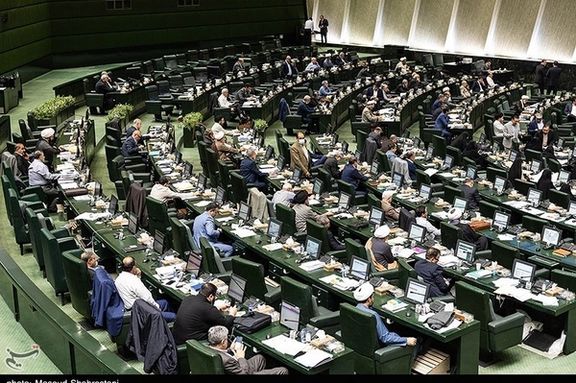
Iran's Parliament sunk into commotion Sunday as a lawmaker tried to stop another one from voicing his constituents’ anger over the so-called ‘chain’ school poisonings.
During a session for examining next year’s budget bill, Seyed Ghani Nazari, the representative of Khalkhal in northwestern Ardabil Province, used his time to speak about his constituents’ anger over the poisoning of schoolgirls in his district.
An ultra-hardliner member of the National Security and Foreign Policy Committee, Javad Karimi Ghodousi, who was standing behind Nazari, kept interrupting him while other lawmakers also shouted to drown his voice. Speaker Mohammad-Bagher Ghalibaf also intervened, asking Nazari to only speak about the budget bill.
“Mr Ghalibaf, what do you expect me to talk about when students were hospitalized in Khalkhal? It’s my duty to demand the government and responsible bodies to investigate. My phone has been ringing since morning and people are asking me to pursue the matter,” Nazari said as other lawmakers joined in the dispute, shouting and gathering around Nazari.
Ghodousi later alleged that those who speak about the poisoning incidents could be “adding fuel to the enemy’s fire”.
The parliament has established a working group to investigate the incidents of mysterious poisonous gas attacks on girls’ schools that have now spread to around 100 cities.
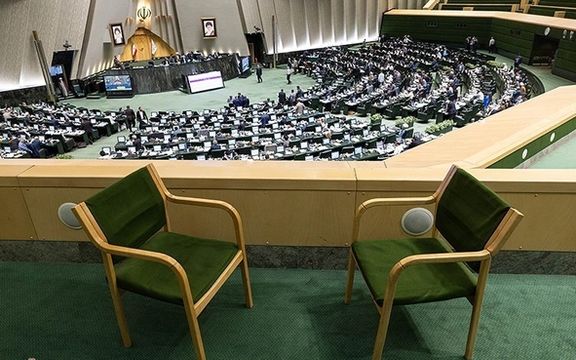
Poisoning of students was reported in at least 80 more schools across the country Sunday.
Hardliners and government officials are increasingly attributing the gas attacks to “students’ pranks” or “enemies of the Islamic Republic”.
Authorities have yet not offered any report on the incidents or on findings based on samples taken from over 1,500 students who have been hospitalized since the first incident took place in the religious city of Qom on November 30.
The ultra-hardliner Kayhan newspaper whose chief editor Hossein Shariatmadari is an appointee of the Supreme Leader Ali Khamenei on Saturday claimed that opposition groups such as the Mujahedin-e Khalq Organization (MEK) have been perpetrating the attacks on behalf of foreign enemies and casting the blame on religious groups in Iran or the government.
“It’s worthy of note that certain western governments and intelligence services have a long history of committing crimes and blaming others for them including the chemical attacks by their Sunni extremist mercenary groups in Syria for which they blamed the Syrian government. The CIA and Mossad have committed many acts of biological terror,” Kayhan wrote.
However, such claims are countered by citizens that how the ‘enemy’ is able to conduct such widespread attacks if the government has control over the country.
The IRGC-linked Fars News Agency on Sunday claimed that experts believe pranks by teenage students or “mass phobia” are the most likely explanations for the mysterious poisonings.
Given the highly synchronized nature of the attacks, many in Iran accuse the government of having a direct role in the poisoning of schoolgirls, as revenge for their rejection of the hijab and their active role in the Woman, Life, Freedom protests in the past few months. Even if some fundamentalist groups are behind the chemical attacks the government stands accused of covering up their crime.
“People from inside the system must be collaborating with the perpetrators,” wrote Abbas Akhoundi, a roads and urban development minister in Hassan Rouhani’s government, in Shargh newspaper Saturday.
Some medical experts such as Dr. Mohammadreza Hashemian, an official of Masih Daneshvari Hospital in Tehran where many of the victims have been treated, have pointed out that the gases suspected of being used by the attackers seem to be composed of various chemicals that are not accessible to ordinary people.